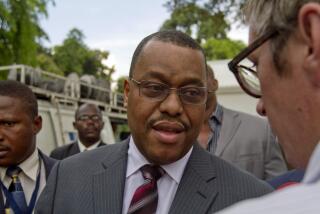Aristide, Haiti’s exiled former president, offers to return
- Share via
Reporting from Johannesburg — Former Haitian President Jean-Bertrand Aristide, deposed and exiled in a 2004 coup, offered today to return to Haiti, saying he could not wait to go home and rebuild his country after Tuesday’s devastating earthquake.
In a rare public statement, he said he felt a profound need to go to try to save the lives of victims awaiting rescue.
Aristide said supporters around the world had promised a plane to fly him in, with emergency relief. Yet he offered no details on how he planned to return. His choice of venue -- a hotel at Johannesburg’s international airport, was symbolic of his will to return, Aristide said.
“As far as we are concerned, we are ready to leave today, tomorrow, at any time to join the people of Haiti, to share in their suffering, help rebuild the economy, moving from misery to poverty with dignity,” Aristide said, reading a statement in an almost inaudible whisper. His wife Mildred was at his side, her eyes downcast throughout the brief news conference.
Aristide, 56, a former priest, was visibly emotional, wiping away tears as he left the room after reading the statement.
Supporters in Haiti have continued to call for his return over the years, and he remains popular with many Haitians. In 2006, Aristide said Haitians wanted his return: “It’s a love story. They love me and I love them,” he told the BBC, hinting he was interested in teaching, not politics.
The earthquake has only deepened his wish to return.
“While we cannot wait to be with our sisters and brothers in Haiti, we share the anguish of all Haitians in the diaspora who are desperate to reach family and loved ones,” he said.
He refused to take questions on whether he planned to fly to Haiti without an official invitation.
Aristide was Haiti’s first democratically elected leader in 1990 but was ousted in a military coup led by the army a year later. He regained power in 1994 and was reelected as president in 2000, before being toppled again in a violent 2004 coup.
He was flown in a U.S. plane in an evacuation organized by the U.S., France and Canada to the Central African Republic in what he later described as a “kidnapping.”
Aristide later took asylum in South Africa, where he lives in the capital, Pretoria, in a house provided by the South African state. He rarely appears or speaks in public.
Aristide spoke of his love for his country and anguish at the thought of the quake victims still buried in the rubble.
“As we all know, many people remain buried under tons of rubble waiting to be rescued. When we think of their suffering, we feel deeply and profoundly that we should be there, in Haiti, with them, trying our best to prevent death.
“To symbolize this readiness we have decided to meet not just anywhere, but in the shadow of Oliver Tambo International Airport,” he said. “Today this spirit of solidarity must and will empower all of us to rebuild Haiti.”
Aristide was accompanied by a South African foreign affairs official, Saul Kgomotso Molobi, who said few could imagine how emotional Aristide was when he contacted the former president to convey media requests for interviews after the earthquake.
Aristide thanked South Africa and other “true friends of Haiti” who sent aid and rescue teams.
More to Read
Sign up for Essential California
The most important California stories and recommendations in your inbox every morning.
You may occasionally receive promotional content from the Los Angeles Times.










